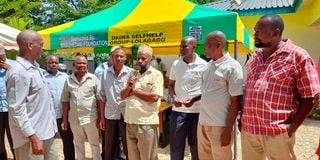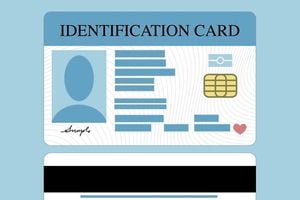Breaking News: Former Lugari MP Cyrus Jirongo dies in a road crash

Some of the representatives of the Pemba community from Kilifi, Mombasa and Kwale counties when they mey at the Lungalunga CDF office in Kwale County on February 14, 2022.
For the Pemba community living in Kenya, the decision by the government of President William Ruto to confer them Kenyan citizenship last year came as a blessing.
The community that entered Kenya in the early 1960s and settled along the coastal strip had all along suffered exclusion from critical services, which required national identification.
In July last year, during a colourful event at the Karisa Maitha grounds in Kilifi town, Dr Ruto issued a section of the community with birth certificates, national identification cards, and title deeds.
The president had earlier in January 2023 declared that the community is recognised as a Kenyan ethnic group, through a special Gazette notice.
However, a section of the community members are yet to benefit, all thanks to a decision they made decades ago while trying to assimilate with local communities.
Mr Dida Hamadi Makame, one of the community members, said due to the fear of being arrested by the police for being in the country illegally, many of them registered for their national identification cards using names borrowed from other local communities.
According to Mr Makame, this has now become an obstacle to those who would like to get new national ID cards under their real Pemba names.
Apply for ID cards
He explained that the challenge is serious to the community, especially their children who are turning 18 years old and want to apply for ID cards.
Mr Makame has not been able to change his name from Dida Hamisi Idi, a name he says he acquired in 1986 to protect himself from police harassment and arrest to Dida Hamadi Makame, his real name.
“My children are asking me, father, now what shall we do because we are Pembas and we need to register for IDs, how will we do it now? I told one to register under any community name to avoid frustrations,” he said.
Mr Abdul Mohamed Mbarari, another community member, said some of them who received ID cards during last year’s event cannot use them because they are often informed that the government’s registry cannot recognise the cards.
This was corroborated by the Pemba Community National Vice-Secretary Omar Kombo who stated that although the government aimed to end statelessness in Kenya, some Pemba community members have been blacklisted.
“Some wives and children of our brothers have been blacklisted. Are we addressing statelessness in this country? The Pemba community will continue to be stateless as long as some of us are blacklisted” he asked.
The community's National Chairperson Shahame Khamis said some of the community's youth have yet to be registered even after undergoing a review by state officials to ascertain their identities.
“We appeal for the government to form a special committee to review the names again and also other Pembas for registration,” he said.
On Friday last week, the community commemorated one year since the Pemba became Kenyans at Karisa Maitha Grounds in Kilifi town.
They asked the government to explain its interpretation of ending statelessness in the country if, to date, some of them are still at a crossroads.
Kilifi North MP Owen Baya, whose 2021 petition paved the way for the community to be identified as Kenyans, said it was unfortunate that some of the ID cards were available physically but not in the digital registry systems.
“We need to rectify the problem. Many of the Pemba community are being discriminated against in the banks because their new IDs do not match the old ones. They are asked to go and swear an affidavit but still they cannot access their money,” he said.
Mr Baya said the frustration was subjecting the Pemba to frustrations and regret changing their ID cards.
He asked the government to dispatch a team to the coastal region where the communities reside to register them appropriately.
“We want to solve this problem this year so that in 2025 there will be no Pemba community member who will go to the bank and be denied services and also have them register for the Social Health Insurance Fund (SHIF),” he added.
Immigration and Citizen Services Permanent Secretary Julius Bitok who was present at Friday’s event said 6,955 Pemba have been registered in the country.
Discrimination
The United Nations High Commissioner for Refugees (UNHCR) estimates that there are an estimated 7,000 Pemba people in Kenya.
Mr Bitok gave an assurance that the government will ensure the community enjoys their Kenyan citizenship status without discrimination.
“The government is committed to ensuring that the Pemba community, like any other Kenyan, are employed and access all government services without discrimination,” he said.
The UNHCR Kenya Representative Caroline van Buren encouraged the government to adopt inclusive development policies to ensure full social and economic integration of the Pemba community alongside other populations including equitable access to education, healthcare, employment and social protection services.
She stated that though Kenya has made tremendous strides in efforts to eradicate statelessness, there are still an estimated 9,800 individuals who remain stateless, among them Rwandan descent and the Rundi community.
“UNHCR will continue to provide technical advice and logistical support in the government's efforts to identify, map and register eligible stateless persons and complete legal reforms to address statelessness,” she said.









